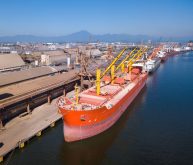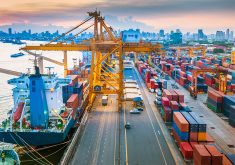BlackRock, along with Terminal Investment Ltd., a Swiss company, has acquired a 90 per cent stake, for $23 billion, in the Panama Ports Company from CK Hutchison, a Hong Kong-based company.
The deal will give the BlackRock consortium control over 43 ports in 23 countries, including the ports of Balboa and Cristobal, located at either end of the Panama Canal.
“A Hong Kong company had taken control over the ports that are set at the Atlantic and Pacific mouths of the Panama Canal,” John Sitilides, a principal at Trilogy Advisors in Washington, D.C., specializing in U.S. government relations, geopolitical risk and international affairs, told the recent Alberta Beef Conference in Calgary.
Read Also

New coal mine proposal met with old concerns
A smaller version of the previously rejected Grassy Mountain coal mine project in Crowsnest Pass is back on the table, and the Livingstone Landowners Group continues to voice concerns about the environmental risks.
“This was not an issue before 2020 because Hong Kong was still a relatively free entity, certainly less free than it was in the British control, but it was only after the Communist Party of China imposed its national security law over Hong Kong that Hong Kong became, from an American perspective, essentially an arm of the Communist party,” said Sitilides.
“(U.S. president) Donald Trump has said in the event of a crisis with China over the South China Sea or Taiwan, or another issue in the Indo Pacific region, who’s to say that the Chinese military won’t close off American access to the Panama Canal, through which 40 per cent of American trade in Asia takes place?”
The Panama Canal deal serves as a snapshot of the importance of maritime security to a free and open trading system that has connected markets from all over the world and that has benefited Canada, the United States and other allies.
There has been a largely unfettered maritime security framework on the global stage for the last several decades, Sitilides said, until the war erupted in the Middle East in the last year and a half.
“What we had happening down at the southern mouth of the Red Sea, is the Iranian financed, armed, equipped and supported Houthi militia that controls the government in Yemen, attacking global shipping coming from this maritime super highway across the Indian Ocean, connecting Asian markets and Middle Eastern hydrocarbons to European markets. This choke point has been cut off by this Houthi militia using essentially $3,000 to $4,000 drones and rockets. We have shipping companies that have said, ‘we can’t go through here anymore. It’s too dangerous to our crews, to our cargo, to our ships,’ ” said Sitilides.
“They’re now having to go around the massive African continent, adding anywhere from 10 to 14 days of shipping time, a million dollars worth of diesel fuel, skyrocketing insurance costs and severe disruptions to supply chains, especially to the European Union. The problem from the U.S. perspective has been that to try to thwart the Houthi militia, we’re firing four, five and $6 million cruise missiles. After a certain point, we’re depleting our inventory that we need either to supply Israel, to supply Ukraine, although we’ll see where that goes with the Trump administration, and to be prepared for a potential crisis in the Indo Pacific. So it’s not sustainable. We get very little of any trade volume coming through the Red Sea to the United States. We’re essentially defending many of these shipping lanes and show points for our allies in Europe and in Asia.”
Sitilides said ocean shipping remains vital to international trade.
“As terrestrial creatures, we often forget that about 70 per cent of the Earth’s surface is comprised of oceans, waterways and seas. On these oceans, waterways and seas, about 90 per cent of global commerce by volume moves around the world, and about 80 per cent of the world’s oil and liquefied natural gas to power and literally lubricate economies worldwide,” he said.
The free and open trading system in travel through the world’s waterways has been largely led and protected by the United States, with help from allies Canada and Mexico in North America, and in Asia, Europe, Africa and throughout Latin America. It is a system that was inherited by the U.S. from the British Empire after it collapsed following the Second World War, and was consolidated with the collapse of the Soviet Union and the end of the Cold War.
“(It) gave us this era of globalization and the most tremendous era of relative peace and prosperity that we’ve ever known. There’s never been a better time to be alive as a human being in almost every part of the world than today from a purely material perspective,” said Sitilides.
“Maybe we’re quite broken spiritually, but that’s a different discussion, but materially, in terms of food security, shelter, technology, quality of life, miraculous conveniences that we utterly take for granted that people 50 and 100 years ago could never imagine, or what we are privileged to enjoy in the advanced industrial West. Maybe hundreds of millions, tops a billion people, and seven billion people around the world, are desperate to enjoy the lifestyle that we enjoy in Canada, in the U.S. and the rest of the industrial world.”
Maritime trade powered a global economy worth approximately $115 trillion at the end of last year. The U.S. has the biggest piece of the pie at $30 trillion with China in second at $20 trillion.
U.S. involvement in keeping crucial ocean trade routes open has had its security components in recent years involving the Panama Canal. There are water pathway choke points all over the world, and from a geopolitical standpoint, they have been beset by terrorism, piracy, sabotage and blockades.
The U.S. Navy, working with regional allies in different parts of the world, has kept the choke points open for free shipping.
Sitilides said the U.S.’s recent focus on the Panama Canal is economical but also linked to its national security.

















